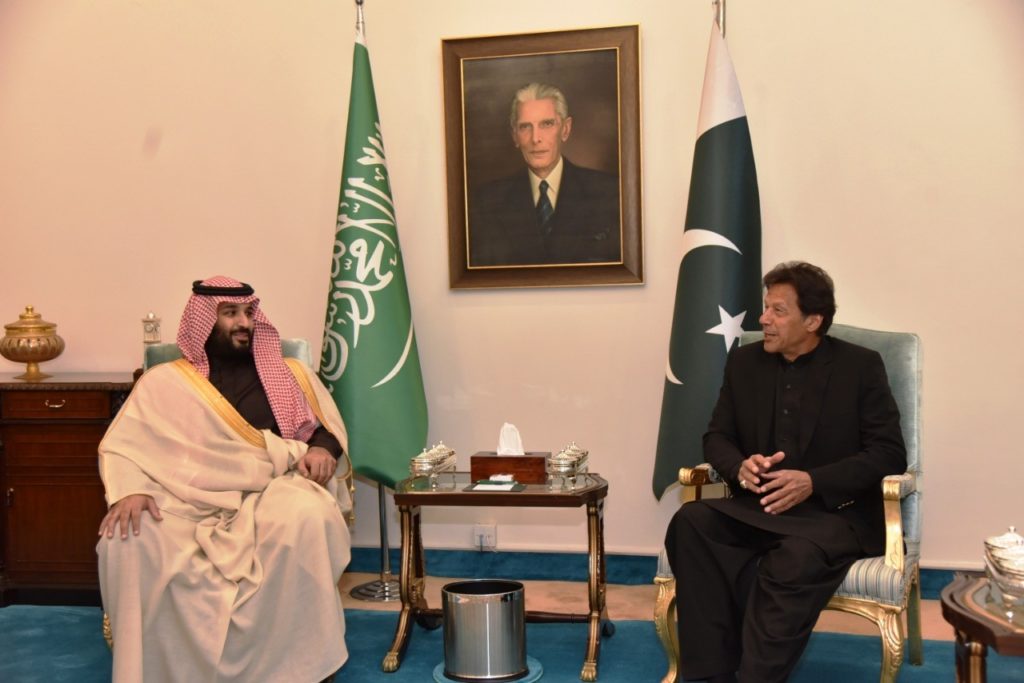Pak-Saudi face-off over Kashmir: The view from Dhaka
Further, the governments of Saudi Arabia and Iran refused to allow Pakistan diplomatic missions to hold public events to observe the October 27 anniversary of Jammu & Kashmir’s accession to India as a Black Day.

By Saleem Samad
The Islamic Republic of Pakistan has now fallen out of grace from Saudi Arabia. The diplomatic relations have gone cold after Islamabad attempted to ally with Turkey.
In recent times, the relations with the Kingdom of Saudi Arabia (KSA) and Turkey have dived further after the murder of Saudi journalist Jamal Khashoggi in the Saudi consulate in Istanbul in October 2018.
The Kingdom’s crown prince, Mohammed bin Salman bin Abdulaziz Al Saud (popularly known as MBS), squeezed Pakistan’s Prime Minister Imran Khan to repay a $1 billion loan.
To further humiliate Pakistan, the Kingdom announced that the $1 billion, repaid by Pakistan, would be invested in Reliance Jio Fibre in India.
Embarrassed, Pakistan saved its face by repaying the debt with the help of China, and Khan’s electoral vision for “Naya Pakistan” is in shambles.
After Indian Prime Minister Narendra Modi struck Article 370 from Jammu & Kashmir on August 5, 2019, which revoked its special status, Islamabad did not hesitate to criticize Riyadh over the contentious issue.
The worst is yet to come.
On October 24, Saudi Arabia released a 20 Riyal banknote to commemorate its presidency of organizing a G-20 summit on November 21-22. The world map displayed at the rear of this commemorative banknote deliberately scraped Gilgit-Baltistan and Kashmir from the map of Pakistan.
Riyadh was angered over Islamabad’s official publication of a new political map in August 2020, which have shown Kashmir annexed with Pakistan, leading Delhi to term it as “political absurdity.”
Riyadh believes Pakistan has no legitimacy over Gilgit-Baltistan and Jammu & Kashmir. The depiction of the map of Pakistan devoid of Kashmir and Gilgit-Baltistan has adequately disgraced Pakistan in the international arena, particularly in the Muslim world.
Well, the disputed Jammu & Kashmir have been taken out from the map of India too. The map depicts Kashmir Valley as an independent nation.
South Block in New Delhi immediately protested for the exclusion of Kashmir from India and demanded an explanation. Riyadh is yet to issue a statement.
China, an all-weather friend of Pakistan, had been irked in the process and along with Pakistan has thrice dragged the Kashmir issue to the UN Security Council in the past year.
Pakistan miserably failed to draw the attention of the 57 members of Muslim nations — the Organization of Islamic Conference (OIC) — for a call for condemnation on scraping Kashmir autonomy.
During the China and India face-off over Ladakh and Arunachal Pradesh, Pakistan became desperate to form a new bloc with Turkey, Iran, Malaysia, China, and Russia, outside the traditional dictates of the United States. Malaysia silently backed out.
The Kingdom has given a clear signal to Islamabad that the KSA-India economic ties have strengthened with a rejection of any financial aid to Pakistan, something which is a new marker in international relations.
Observers understand that Saudi Arabia’s attitude towards Pakistan may also be “read” as “no confidence” against China.
Further pouring salt in the wounds, the governments of Saudi Arabia and Iran refused to allow Pakistan diplomatic missions to hold public events to observe the October 27 anniversary of Jammu & Kashmir’s accession to India as a Black Day.
Plans to hold a public event inside Pakistan’s consulate in Riyadh were also blocked by the Kingdom.
Similarly, the Pakistan embassy in Tehran’s proposal to hold an event at Tehran University to observe the Black Day was refused.
The change in stance adopted by two influential Islamic countries is a reflection of Pakistan’s equations in the Middle East as a fallout of its growing partnership with Recep Tayyip Erdogan, who is seen to aspire for a leadership role in the Islamic world.
Analysts believe Imran Khan had bitten off more than he could chew. It’s a clear sign of Khan’s growing desperation for his failure to garner support over India’s abrogation of Article 370 in Kashmir.
Saleem Samad is an independent journalist, media rights defender, and recipient of Ashoka Fellowship and Hellman-Hammett Award. Twitter: @saleemsamad.
Views are personal and International Affairs Review neither endorses nor are responsible for them.